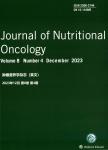Diabetes: An Accomplice to Cancer
Diabetes: An Accomplice to Cancer作者机构:Cancer Center The First Hospital of Jilin University Changchun Jilin 130021 China Department of Hepatobiliary and Pancreatic Surgery The First Hospital of Jilin University Changchun Jilin 130021 China Pediatric Research Institute Departments of Pediatrics Radiation Oncology Pharmacology and Toxicology University of Louisville Louisville KY 40202 USA
出 版 物:《Journal of Nutritional Oncology》 (肿瘤营养学杂志(英文))
年 卷 期:2019年第4卷第1期
页 面:9-15页
学科分类:07[理学]
基 金:grants from the NationalNatural Science Foundation of China grant (81672275,81874052, 3A214DJ63428) the Ministry of Science and Technology Project of Prevention and Control of Major Chronic Noncommunicable Diseases(2016YFC1303804)
主 题:Cancer Diabetes Epidemiology Abnormal metabolism Therapy Targeted drug
摘 要:Worldwide, cancer and diabetes are two major chronic diseases that have great impacts on human health. Clinical and basic research studies have shown that diabetes, especially type 2 diabetes mellitus (T2DM), can promote the incidence and development of colon, pancreatic, breast, liver and bladder cancers. Hyperglycemia, chronic inflammation and abnormal metabolism are considered to be major risk factors involved in the development of cancer. Notably, some treatments used for diabetes, such as maintenance of a healthy diet and the use of hypoglycemic drugs to control blood glucose levels, may decrease the risk of cancer. On the other hand, metabolic disorders and the organ damage caused by cancer can also promote or accelerate the progression of diabetes. By reviewing the relevant literature, we found that diabetes can promote the occurrence and development of some cancers, and cancer can, in turn, influence diabetes. We herein discuss and summarize the mechanisms underlying the relationship between diabetes and cancer and the new therapeutic strategies based on this relationship.



